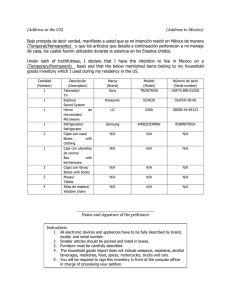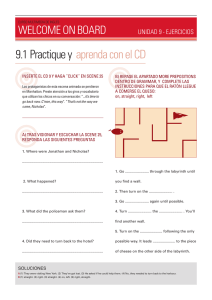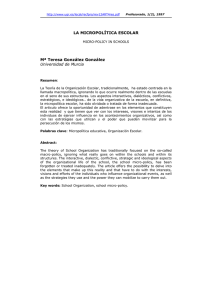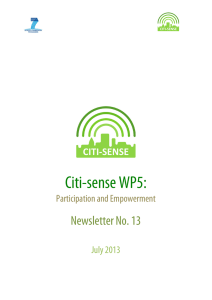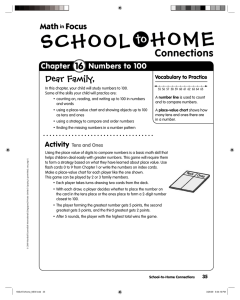5safety talk - National Safety Council
Anuncio
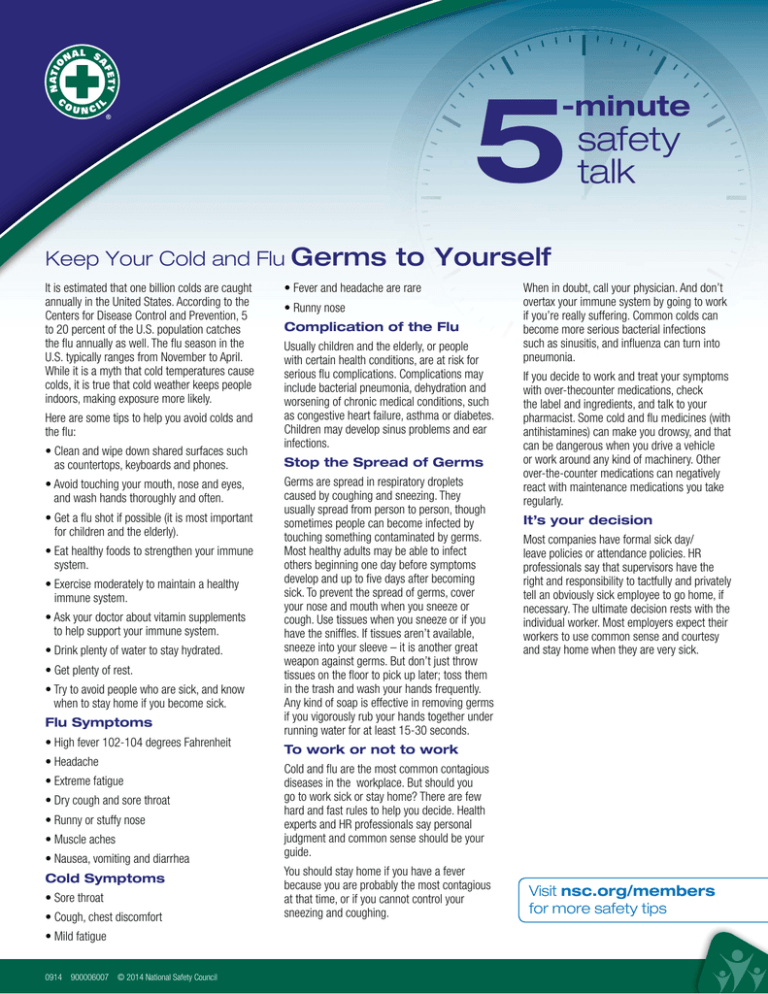
-minute
5
Keep Your Cold and Flu
*UJTFTUJNBUFEUIBUPOFCJMMJPODPMETBSFDBVHIU
annually in the United States. According to the
$FOUFSTGPS%JTFBTF$POUSPMBOE1SFWFOUJPO
to 20 percent of the U.S. population catches
the flu annually as well. The flu season in the
U.S. typically ranges from November to April.
While it is a myth that cold temperatures cause
colds, it is true that cold weather keeps people
indoors, making exposure more likely.
Here are some tips to help you avoid colds and
the flu:
t$MFBOBOEXJQFEPXOTIBSFETVSGBDFTTVDI
as countertops, keyboards and phones.
t"WPJEUPVDIJOHZPVSNPVUIOPTFBOEFZFT
and wash hands thoroughly and often.
t(FUBnVTIPUJGQPTTJCMFJUJTNPTUJNQPSUBOU
for children and the elderly).
t&BUIFBMUIZGPPETUPTUSFOHUIFOZPVSJNNVOF
system.
t&YFSDJTFNPEFSBUFMZUPNBJOUBJOBIFBMUIZ
immune system.
t"TLZPVSEPDUPSBCPVUWJUBNJOTVQQMFNFOUT
to help support your immune system.
t%SJOLQMFOUZPGXBUFSUPTUBZIZESBUFE
t(FUQMFOUZPGSFTU
t5SZUPBWPJEQFPQMFXIPBSFTJDLBOELOPX
when to stay home if you become sick.
Flu Symptoms
t)JHIGFWFSEFHSFFT'BISFOIFJU
t)FBEBDIF
t&YUSFNFGBUJHVF
t%SZDPVHIBOETPSFUISPBU
t3VOOZPSTUVGGZOPTF
t.VTDMFBDIFT
t/BVTFBWPNJUJOHBOEEJBSSIFB
Cold Symptoms
t4PSFUISPBU
t$PVHIDIFTUEJTDPNGPSU
t.JMEGBUJHVF
ª/BUJPOBM4BGFUZ$PVODJM
safety
talk
Germs to Yourself
t'FWFSBOEIFBEBDIFBSFSBSF
t3VOOZOPTF
Complication of the Flu
Usually children and the elderly, or people
with certain health conditions, are at risk for
serious flu complications. Complications may
include bacterial pneumonia, dehydration and
worsening of chronic medical conditions, such
as congestive heart failure, asthma or diabetes.
Children may develop sinus problems and ear
infections.
Stop the Spread of Germs
(FSNTBSFTQSFBEJOSFTQJSBUPSZESPQMFUT
caused by coughing and sneezing. They
usually spread from person to person, though
sometimes people can become infected by
touching something contaminated by germs.
Most healthy adults may be able to infect
others beginning one day before symptoms
EFWFMPQBOEVQUPmWFEBZTBGUFSCFDPNJOH
sick. To prevent the spread of germs, cover
your nose and mouth when you sneeze or
cough. Use tissues when you sneeze or if you
IBWFUIFTOJGnFT*GUJTTVFTBSFOUBWBJMBCMF
sneeze into your sleeve – it is another great
weapon against germs. But don’t just throw
tissues on the floor to pick up later; toss them
in the trash and wash your hands frequently.
Any kind of soap is effective in removing germs
if you vigorously rub your hands together under
running water for at least 15-30 seconds.
When in doubt, call your physician. And don’t
overtax your immune system by going to work
if you’re really suffering. Common colds can
become more serious bacterial infections
such as sinusitis, and influenza can turn into
pneumonia.
*GZPVEFDJEFUPXPSLBOEUSFBUZPVSTZNQUPNT
with over-thecounter medications, check
the label and ingredients, and talk to your
pharmacist. Some cold and flu medicines (with
antihistamines) can make you drowsy, and that
can be dangerous when you drive a vehicle
or work around any kind of machinery. Other
over-the-counter medications can negatively
react with maintenance medications you take
regularly.
It’s your decision
Most companies have formal sick day/
MFBWFQPMJDJFTPSBUUFOEBODFQPMJDJFT)3
professionals say that supervisors have the
right and responsibility to tactfully and privately
tell an obviously sick employee to go home, if
necessary. The ultimate decision rests with the
individual worker. Most employers expect their
workers to use common sense and courtesy
and stay home when they are very sick.
To work or not to work
Cold and flu are the most common contagious
diseases in the workplace. But should you
go to work sick or stay home? There are few
hard and fast rules to help you decide. Health
FYQFSUTBOE)3QSPGFTTJPOBMTTBZQFSTPOBM
judgment and common sense should be your
guide.
You should stay home if you have a fever
because you are probably the most contagious
at that time, or if you cannot control your
sneezing and coughing.
Visit nsc.org/members
for more safety tips
-minute
5
No Contagie a los Demás
Se estima que mil millones de resfriados ocurren
cada año en los Estados Unidos. Según el Centro
EF$POUSPMZ1SFWFODJØOEF&OGFSNFEBEFT
entre el 5 y el 20 por ciento de la población
estadounidense también se enferma de gripe
cada año. La época de la gripe en los Estados
Unidos suele extenderse entre los meses de
noviembre y abril. Si bien es un mito que las bajas
temperaturas sean la causa de los resfriados,
sí es cierto que el clima frío hace que la gente
permanezca más tiempo adentro, lo cual aumenta
sus probabilidades de exposición.
Le ofrecemos algunos consejos para evitar la gripe
y el resfriado:
t-JNQJFZQBTFVOUSBQPIÞNFEPTPCSFTVQFSmDJFT
de uso compartido,
como mostradores, teclados y teléfonos.
t&WJUFFMDPOUBDUPEFTVTNBOPTDPOTVCPDB
nariz y ojos; lávese bien las manos con
frecuencia.
t%FTFSQPTJCMFWBDÞOFTFDPOUSBMBHSJQFFTNVZ
importante sobre todo en niños y ancianos).
t$POTVNBBMJNFOUPTTBMVEBCMFTQBSBGPSUBMFDFS
su sistema inmunológico.
t3FBMJDFFKFSDJDJPGÓTJDPNPEFSBEPQBSBNBOUFOFS
un sistema inmunológico sano.
t$POTVMUFBTVNFEJDPTPCSFTVQMFNFOUPT
vitamínicos que fortalezcan su sistema
inmunológico.
t$POTVNBBCVOEBOUFBHVBQBSBNBOUFOFSTF
hidratado.
t1SPDVSFVOCVFOEFTDBOTP
t&WJUFFMFTUBSDPOQFSTPOBTFOGFSNBTZTFQB
cuándo quedarse en su casa si usted se
enferma.
Síntomas de gripe
t'JFCSFBMUBHSBEPT'BISFOIFJU
grados centígrados)
t%PMPSEFDBCF[B
t'BUJHBFYUSFNB
t5PTTFDBFJSSJUBDJØOEFHBSHBOUB
t$POHFTUJØOOBTBMPTFDSFDJØOOBTBM
t%PMPSFTNVTDVMBSFT
ª/BUJPOBM4BGFUZ$PVODJM
safety
talk
su Gripe y Resfriado
t/BVTFBTWØNJUPTZEJBSSFB4ÓOUPNBTEF
resfriado
t*SSJUBDJØOEFHBSHBOUB
t5PTNPMFTUJBTFOFMQFDIP
t-FWFGBUJHB
t-BmFCSFZFMEPMPSEFDBCF[BOPTPOTÓOUPNBT
frecuentes
t4FDSFDJPOFTOBTBMFT
Complicaciones del cuadro
gripal
En general los niños y las personas mayores,
o quienes sufren ciertas enfermedades, se
encuentran en riesgo de sufrir complicaciones
serias en su cuadro gripal. Estas complicaciones
pueden ser neumonía bacterial, deshidratación
y empeoramiento de enfermedades crónicas,
como fallo congestivo cardíaco, asma o diabetes.
Los niños pueden desarrollar problemas en las
cavidades de los senos o infecciones auditivas.
Detenga la diseminación de
los gérmenes
Los gérmenes se diseminan en pequeñas gotitas
que generamos al toser o estornudar. Estas
gotitas se trasmiten de persona a persona, si
bien a veces podemos contagiarnos al tocar
VOBTVQFSmDJFDPOUBNJOBEBQPSHÏSNFOFT-B
mayoría de los adultos sanos pueden contagiar a
otros durante un período que va desde el primer
día anterior a la presencia de síntomas hasta
el quinto día después de haberse enfermado
1BSBQSFWFOJSMBEJTFNJOBDJØOEFHÏSNFOFT
cúbrase la boca y la nariz al toser o estornudar.
Utilice pañuelos descartables de papel si tiene
secreciones nasales o al estornudar. Si no dispone
de pañuelos descartables de papel, cúbrase la
boca con la manga al estornudar – es una barrera
muy poderosa contra los gérmenes. No arroje los
pañuelos descartables de papel sobre el piso;
arrójelos en el cesto de residuos y lávese las
manos con frecuencia. Cualquier tipo de jabón
remueve los gérmenes con efectividad si frota
fuertemente sus manos durante al menos 15-30
segundos debajo del agua corriente.
Trabajar o no trabajar
La gripe y el resfriado son las enfermedades
contagiosas más comunes en el lugar de trabajo.
{%FCFSÓBNPTJSBUSBCBKBSTJFTUBNPTFOGFSNPT
o deberíamos quedarnos en casa? Hay algunas
reglas infalibles que le ayudarán a tomar una
decisión. Según los expertos en salud y los
QSPGFTJPOBMFTEF3FDVSTPT)VNBOPTEFCFSÓBNPT
guiarnos por nuestro sentido común y juicio
personal.
%FCFSÓBNPTRVFEBSOPTFODBTBTJUFOFNPTmFCSF
ya que probablemente este sea el período en que
más probablemente podamos contagiar a otras
personas. También deberíamos quedarnos en casa
si no podemos controlar nuestra tos y nuestros
estornudos.
Ante la duda, llame a su médico. Y no sobrecargue
a su sistema inmunológico yendo a trabajar si
realmente no se siente bien. El resfriado común
puede convertirse en una infección bacterial más
grave, como sinusitis. La gripe puede derivar en
neumonía.
Si decide ir a trabajar y tomar medicación de venta
libre para tratar sus síntomas, lea el prospecto
y la composición del medicamento y consulte a
su farmacéutico. Algunos medicamentos para
la gripe y el resfriado contienen antihistamínicos
y pueden causar mareos, lo que puede ser
peligroso si conduce un vehículo o trabaja cerca
de maquinarias. Los medicamentos de venta
libre pueden tener efectos adversos sobre otros
medicamentos que tomamos habitualmente.
La decisión es suya
La mayoría de las empresas tienen políticas
formales de licencia por enfermedad o
QSFTFOUJTNP4FHÞOMPTQSPGFTJPOBMFTEF3FDVSTPT
Humanos, de ser necesario, los supervisores tienen
el derecho y la responsabilidad de acercarse a un
trabajador claramente enfermo y decirle en privado
RVFSFHSFTFBTVIPHBS-BEFDJTJØOmOBMMBUJFOFFM
trabajador. La mayoría de los empleadores espera
que sus trabajadores tengan sentido común y sean
considerados, y permanezcan en casa si están
verdaderamente enfermos
Visit nsc.org/members
for more safety tips
